Newsletter


Our Newsletter
Connections
Jun
6
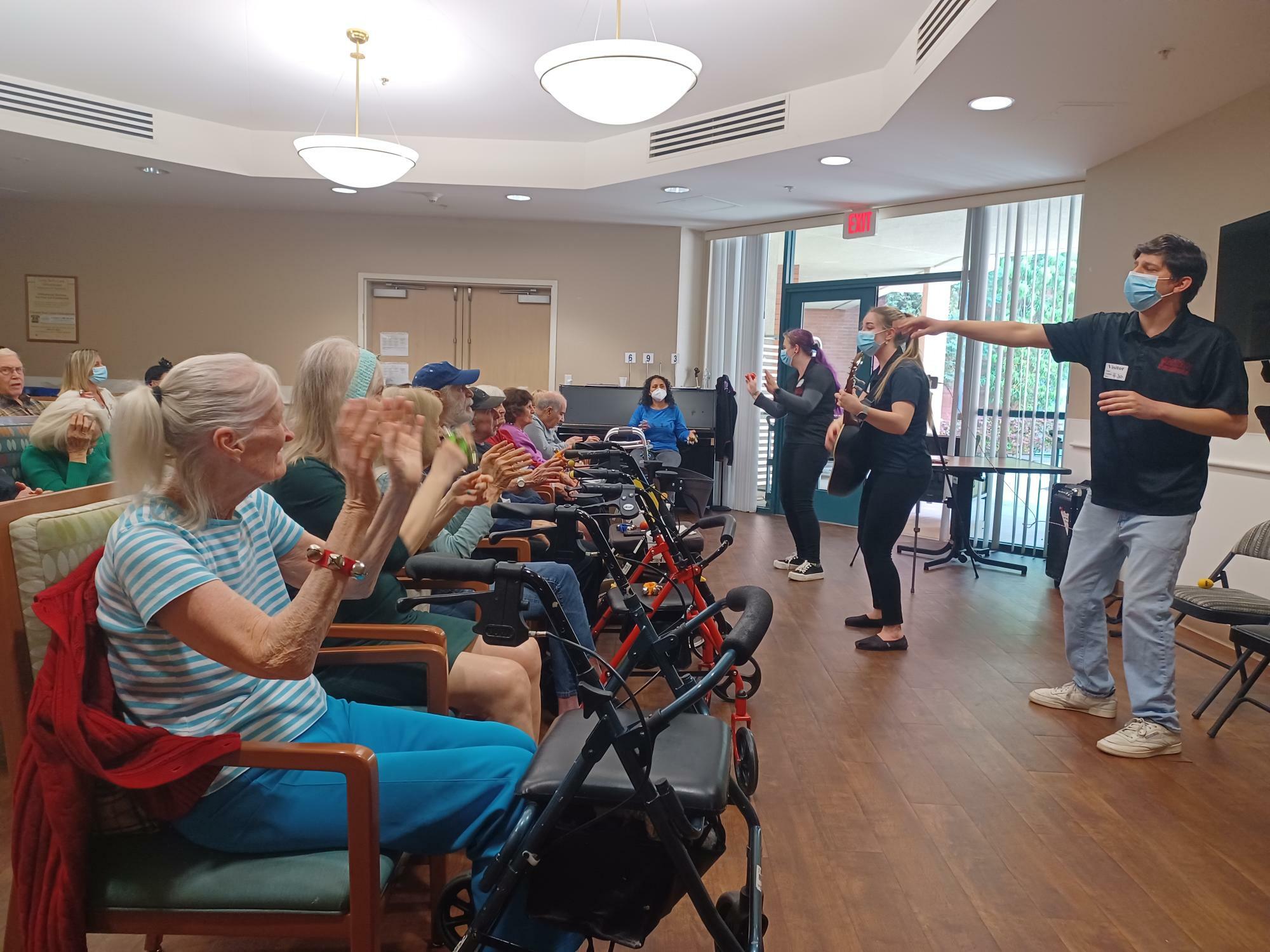
Making Music at Los Angeles Jewish Health
Philosopher Friedrich Nietzsche noted that, “Without music, life would be a mistake.” Celebrating life – and the music that makes it worthwhile – is the focus of therapeutic music services at Los Angeles Jewish Health (LAJH).
Conducted in partnership with the Music Therapy program at California State University, Northridge (CSUN), Los Angeles Jewish Health’s therapeutic music services bring CSUN students to the LAJH campus to stimulate and engage residents with population-appropriate activities. The students – juniors and seniors at CSUN – are working toward their Bachelor of Arts in Music Therapy; once they complete their degree, finish a six-month internship (including 1,200 hours of clinical training), and pass a board certification exam, they become board-certified music therapists. CSUN’s Music Therapy program – an important and growing major at the nexus of healthcare and music – is the only one in the California State University system.
“Music therapy helps promote functional changes in behavior,” says Hilary Yip, chair of Music Therapy at CSUN. “It’s based on science – understanding how our bodies and brains react and respond to music. Music therapists work with people from infancy through their senior years, boosting their social and emotional skills, cognitive and motor skills, and the ability to communicate. For instance, music can help reduce the suffering of adolescents with depression and anxiety and assist adults with dementia in accessing their memories.”
Los Angeles Jewish Health’s collaboration with CSUN is new, and Stacy Orbach, LAJH’s director of volunteer services, is already seeing results. “It’s a win-win situation because the students get experience in their field, and our residents benefit from afternoons filled with music and joy,” she says. “Music is so powerful: It can bring older adults back to a particular time and place in their lives. I’ve been amazed watching their reactions as they travel that path.”
Music has always played a central role at Los Angeles Jewish Health, and volunteers frequently visit to share their talents with residents. But the joint effort with CSUN pairs music enjoyment with a more scientific approach.
“One of the things that’s remarkable about the CSUN partnership is that it both benefits our seniors by making them feel good, and it is also data driven, producing findings that can contribute to the body of medical knowledge about aging and potentially improving seniors’ quality of life down the line,” says Dale Surowitz, chief executive officer and president of Los Angeles Jewish Health.
The program is equally beneficial for the students, enabling them to acquire hands-on experience of going into the community and working with clients. “In class, they’re just playing music for each other, but at Los Angeles Jewish Health, they can witness, first-hand, how their music brings a smile to seniors’ faces,” Hilary says. “It’s so rewarding for them to elicit that reaction and to see how they can use music to impact someone else.”
As part of the partnership, Stacy and LAJH Special Programs Coordinator Julie Lockman-Gold make presentations to CSUN Music Therapy students at the start of each semester, introducing them to Los Angeles Jewish Health and to the needs of its senior population. Over the course of the semester, the students build warm relationships with LAJH residents, forming bonds that enhance the seniors’ sense of fulfillment and well-being.
“Our residents couldn’t be more enthusiastic about these interactions,” Julie says. “At the end of every session, they encourage the students to come back any time.”
Early response to the program has made it a standout success. “I’m so delighted by the feedback we’ve received from our seniors,” Stacy says. “We’re in this partnership for the long term.”
Jun
5
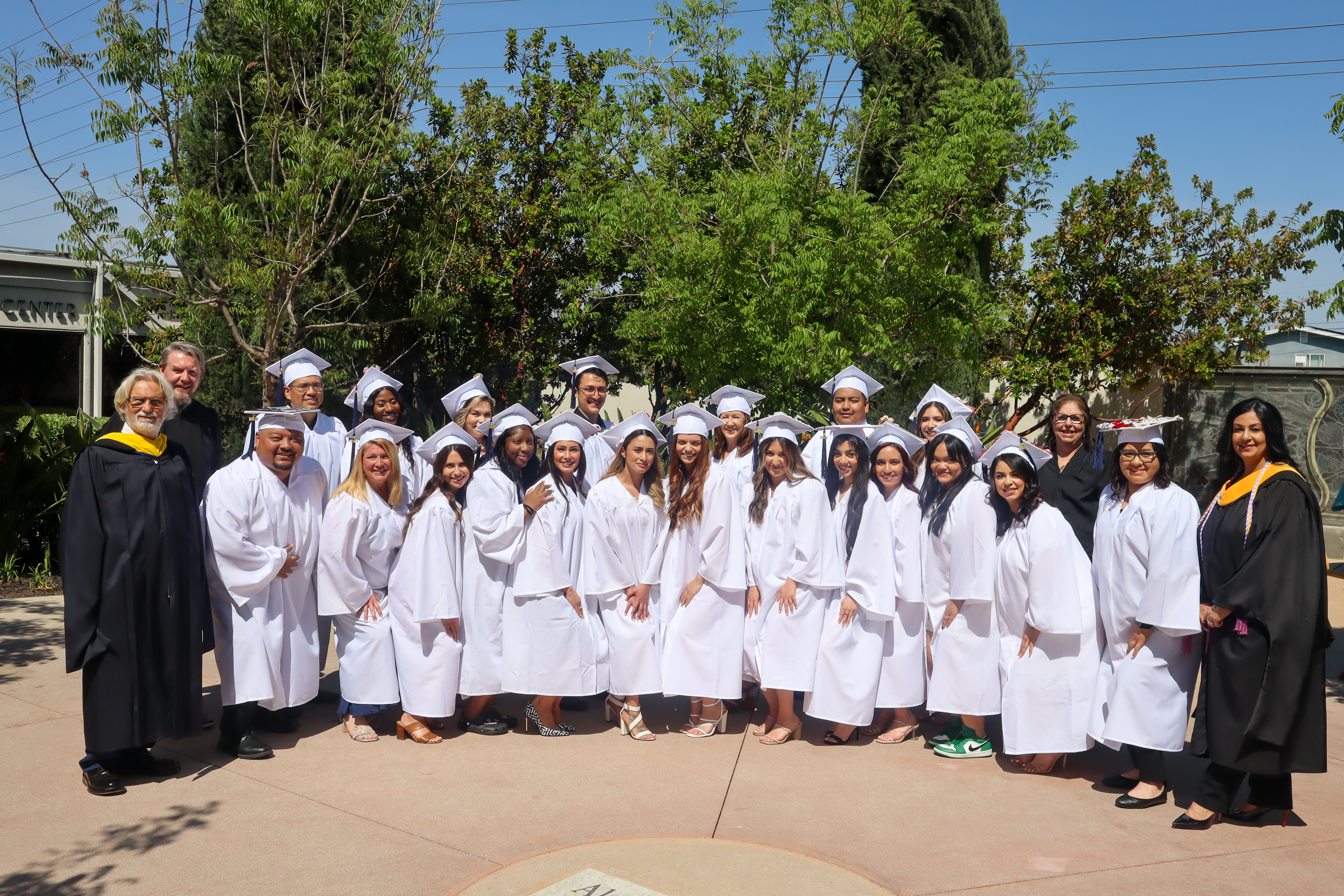
Annenberg School of Nursing Celebrates Class of 2023
Annenberg School of Nursing Class of 2023
Spring carries with it the sweet smell of new beginnings, and so it was this past April that graduates of the Annenberg School of Nursing’s class of 2023 gathered together to mark the culmination of their studies and the start of a fresh chapter as licensed healthcare professionals.
A program of Los Angeles Jewish Health (LAJH), the Annenberg School is a premier destination for nursing education and a prime launching pad for high-impact nursing careers. This year’s 20 graduates were joined by more than 300 family members, friends, and LAJH staff to celebrate their achievements and to help send them off to their exciting futures in healthcare.
Benefitting from a return to in-person classes as school resumed its normal pace in the wake of the pandemic, the graduates gained critical, hands-on experience that prepared them well for their next step.
“They are all getting ready for the state board now, and I’m pleased to say that, thanks to our small cohort and individualized, one-on-one teaching, our passing rates for that exam exceed the state average,” says Amandeep Kaur, the school’s director. “I am confident our most recent graduates will distinguish themselves with their performance!”
The graduation ceremony itself was also in-person – the first one in three years to take place inside, as the past few years, health regulations required a drive-up ceremony in the nursing school parking lot. “We are so thrilled to have been able to share this year’s experience with everyone gathered together.” Amandeep says. “It wouldn’t have been possible without the critical support we received from the talented and caring staff of Los Angeles Jewish Health, its board of directors, and our board of directors at Annenberg School of Nursing.”
The program featured three student speakers including Talin Oz, class valedictorian. “We have worked so hard, gotten through long nights studying, early morning clinicals, and supported each other along the way to be here,” she said in her speech, also noting that the expertise, guidance, and mentorship of Annenberg faculty and staff were “priceless and instrumental in shaping us into the nurses we are today.”
Nina Heckathorn
Nina Heckathorn, who won the prestigious Florence Nightingale Award, also offered remarks at the event. “Theodore Roosevelt said, ‘Nothing worth having comes easy,’ and he must have had us in mind,” she said. “We have all collectively been pushed to our absolute limits and stretched beyond imagination, yet in our stretching we’ve learned not just about our chosen field but about ourselves. Now I can say, without a doubt, it was truly worth it!”
Kanoko Jones
The third graduation speaker was Kanoko Jones, who offered heartfelt congratulations to her peers. “We made it!” she enthused. “We persevered, and we overcame. I am so proud of each and every one of us.For members of the class of 2023, persevering was not always easy. “This class was unique in its own way. We had students who lost family members during the program, as well as some who went through divorce, and others who were suffering from serious medical conditions,” Amandeep says. “But they kept fighting on, and I have such tremendous respect for them. Annenberg is really a special place, and our most recent graduates'' have made it even more so.”
May
2
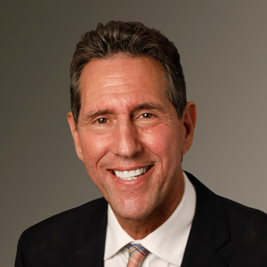
Andrew Berman Celebrated at Los Angeles Jewish Health Circle of Life Gala
Proceeds from Event Expected to Raise $325,000
LOS ANGELES, CA – May 1, 2023) Andrew Berman, Chair of the Board for Los
Angeles Jewish Health (LAJH), formerly Los Angeles Jewish Home, was honored
recently by The Executives, a Support Group of Los Angeles Jewish Health at
their Circle of Life Gala. The evening event held at the Stephen Wise Temple,
April 30, included a crowd of community and religious leaders, his loving family
and LAJH residents and staff. The tribute celebrated Berman's active
participation and numerous contributions to Los Angeles Jewish Health over the
years and highlighted his two terms as Chair of the leading non-profit
organization where 4,000 seniors are cared for each year.
Berman, an entertainment executive, is credited with working to ensure the
growth and sustainability of LAJH at a time when many senior care facilities
across the country were forced to go out of business over recent years. He was
instrumental in helping to ensure LAJH remained on the forefront of excellent
care throughout the COVID pandemic taking all measures to keep residents and
participants healthy. His efforts helped to quickly start to rebuild the numbers
of those served by LAJH as soon as admissions were able to reopen. To ensure the
future growth and sustainability of the organization, Berman led the charge for
the century old organization to enhance their marketing efforts. This included
taking the bold step to update the name from Los Angeles Jewish Home to Los
Angeles Jewish Health, a name that better reflects the vast selection of
programs, services, and living options offered to older adults from throughout
the community.
In commenting on Berman's special recognition Dale Surowitz, Chief Executive
Officer and President of Los Angeles Jewish Health shared, "I have had the
pleasure of working with many volunteer leaders over the years. Andy sets the
bar for all who take on the role of Chair for any non-profit organization. He is
hands on and his energy and commitment bring out the best in all of us. I
consider him a great leader, partner and friend."
Andrew Berman with Danny Rosett and Ira Halpern, Gala Co-Chairs.
The special evening premiered a new LAJH video showcasing all of the many
living options, services and programs available. Then, the highlight of the
evening was a tribute video about Berman where staff, volunteer leadership,
family members and Rabbi David Woznica of Stephen Wise Temple spoke of the
extraordinary contributions of time and talent Berman has made, not only at Los
Angele Jewish Health, but throughout the Los Angeles Community throughout his
life.
Proceeds from the evening are expected to reach $325,000.
Apr
30
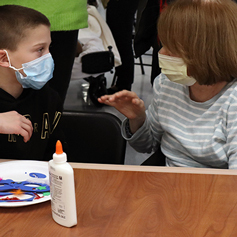
From Generation to Generation at Los Angeles Jewish Health
As a leading national expert in the provision of senior care, Los Angeles Jewish
Health has found a secret to graceful aging: youth. Through an expanded focus on
intergenerational programming, the organization is bringing diverse groups of young
people to its San Fernando Valley campuses to lift seniors' spirits and allow them
to see the world through new eyes again.
It's all part of an ongoing focus at Los Angeles Jewish Health to identify innovative
ways to enhance residents' lives. Commenting on the successful program, Chief Executive
Officer and President Dale Surowitz says that "The goal is to inspire our seniors
and to give them a reason to get excited about each day. I've seen first-hand how
interactions with young people can light up our residents and fill them with enthusiasm.
It is truly a wonderful thing to behold."
The benefit, Dale notes, is mutual. "Our residents get so much from being
with younger folks—and the younger folks are also enriched in so many ways,"
he says. "Hearing about seniors' experiences, and sharing in their wisdom,
adds meaning to their lives, as well."
Now that many of the pandemic health regulations have lifted, intergenerational
in-person events are coming back to Los Angeles Jewish Health in a big way. "We're
scheduling visits from youth groups, preschoolers, synagogues, primary schools,
and more," says Stacy Orbach, the organization's director of volunteer services. "There's
so much going on here; we've never had so many wonderful programs happening on both
campuses at once!"
Examples of these intergenerational programs abound: In February, to celebrate
Sweetheart's Day (Los Angeles Jewish Health's version of Valentine's Day), fifth
graders and parents from Brentwood School stopped by to sing to residents and join
them in arts and crafts projects. At Purim, preschoolers from a nearby Israeli gan
(daycare) came to celebrate, arriving in costume and dancing for residents. Over
Passover, a seventh-grade class from Temple Judea visited, chatting with residents
and engaging them in activities. That same class returned a few weeks later, for
Yom Ha'atzmaut (Israeli Independence Day), playing Israeli bingo with residents
and continuing conversations they started during their first visit.
"I saw one of the residents hugging a boy from Temple Judea. When I asked
her about it later, she said, ‘He remembered me from last time! It made me feel
so good, I had to give him a hug.' Those are the moments we're trying to create,
helping spark joy for our seniors that brightens up their days," says Julie
Lockman-Gold, special programs coordinator.
Those moments are also powerful for visiting students. "We had an elementary
school class come from Heschel Day School. As the students were leaving, one of
them said to me, ‘Don't be surprised when you see me here volunteering when I'm
older, because I loved this!'" Stacy says. Members of a music
club from Taft High School recently stopped by to perform swing and jazz numbers
for the residents. "One of our seniors was just dancing in her chair like crazy,"
Julie recalls. "She came up to the students afterward and told them, ‘I'm 98,
and I'm blind, but I can hear. Many years ago, I was a singer. Your songs are bringing
me back, and this is such a treat.' It was incredibly moving."
Not all visitors to Los Angeles Jewish Health are part of the under-18 set. The
organization's own board chair, Andrew Berman, has launched a weekly program called
the Men's Club—a discussion group that enables him to spend time with, and
get to know, residents of the skilled nursing facility on Los Angeles Jewish Health's
Grancell Village campus.
"We talk about a range of subjects, from food to politics to cars. Everyone
gets to share their different perspectives, which is so healthy and energizing and
therapeutic," Andy says. "It's also really gratifying for me because I
learn so much from these guys. I'm just thrilled to be able to do it."
Building on our vision of enriching our residents each day, the staff at Los
Angeles Jewish Health is committed to ramping up intergenerational programming even
more in the near future. "We're doing everything we can to bring enrichment
to the lives of our residents," Stacy says. "This is one of the things
that differentiates us from every other facility in Los Angeles—we've taken
it to a higher level." Reaching that "higher level" has
been made possible through gifts from donors and foundations such as the Steven
Ohren Foundation, which helps fund the music therapy program and certified therapy
dog program at Los Angeles Jewish Health. "People in our community recognize
the importance of intergenerational programming and want to contribute to it,"
says Corey Slavin, senior vice president of the Los Angeles Jewish Health Foundation. "We
are grateful for our donors' partnership—and, of course, additional support
is always welcome."
Apr
30
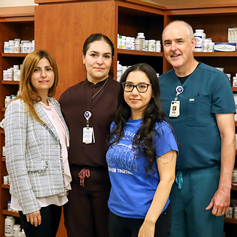
A Prescription for Senior Health
On the national landscape of senior care facilities, Los Angeles Jewish
Health stands apart. It distinguishes itself on multiple levels: through the
quality of its care, the breadth and depth of its expertise, and the warmth and
compassion of its dedicated staff. There is also another key differentiator:
Unlike most of its peer institutions, Los Angeles Jewish Health has a
full-service, on-site pharmacy, raising the bar on excellence in senior health
across our community.
Located in the Joyce Eisenberg Keefer (JEK) Medical Center on Los Angeles
Jewish Health's Grancell Village campus, the pharmacy was licensed in 2007 and
can dispense medication to residents in JEK's skilled nursing facility, as well
as to individuals in the Auerbach Geriatric Psychiatry Unit (AGPU). Pharmacy
director Aida Oganesyan oversees one other pharmacist and four pharmacy
technicians, as well as a pharmacy resident in conjunction with Western University of Health
Sciences College of Pharmacy (WesternU).
"We're a devoted team, and we take pride in our commitment to going above
and beyond to meet a broad range of residents' needs," Aida says. "We make it
our goal to get to know our patients so we can be active partners in their
care."
Value of care is a major priority for Aida and her colleagues. "It's
something we really emphasize: developing good relationships with providers
(whether they're primary care, nurse practitioners, or nurses) and learning the
backgrounds of our patients to ensure we're providing the same quality of care
we would give our own loved ones," she says.
As part of their effort to understand Los Angeles Jewish Health residents'
needs, the pharmacy team often interacts with patients and their families. "We
do comprehensive medication reviews with residents;
we talk to family members if they have questions about residents' medications;
and we interact with seniors in the AGPU," Aida says. "We all work
collaboratively to advance Los Angeles Jewish Health's signature focus on
patient-centered care."
This high level of personal attention is a key point of distinction between
Los Angeles Jewish Health and other senior care organizations. "Most skilled
nursing facilities solely rely on a contracted pharmacist who reviews the
residents' medications monthly. At Los Angeles Jewish Health, our pharmacists
and pharmacy technicians monitor our residents' medications daily," says Chief
Medical Officer Noah Marco, MD. "Aida and her team help our physicians prescribe
the right medication, at the right dose, at the right time—all the time."
The AHSP-accredited pharmacy residency program is another unique feature of
Los Angeles Jewish Health's pharmacy services. "Each year, we precept a yearlong pharmacy resident through our collaboration with WesternU for a year of hands-on learning and mentoring,
and they get licensed during their time with us," Aida says. "We're proud to
help nurture the next generation of pharmacists."
Aida, who became the interim director of pharmacy in 2020 and then took the
position permanently in 2021, served as Los Angeles Jewish Health's first
pharmacy resident in 2013. "Los Angeles Jewish Health has been my home since the
very beginning of my career, and I can say with absolute certainty that this
place is truly exceptional," she says.
In addition to its role as a training ground for young pharmacy talent, Los
Angeles Jewish Health is also a launching pad for innovative initiatives that
are advancing the field of pharmacy writ large. "We've developed an antibiotic
stewardship program with our providers, and we have a pharmacist-led
hypertension management program," Aida says. "Now, we're developing a
transitions of care program with the Taper building, where we review medications
for short-term rehab patients."
These innovations, in conjunction with published research conducted by Los
Angeles Jewish Health pharmacists, are expanding the tools pharmacists can use
to increase the health and wellness of seniors both locally and nationwide.
The bottom line, according to Dr. Marco? "Our pharmacists are making the
lives of our residents better and improving outcomes for countless older adults
around the country," he says.
Mar
31
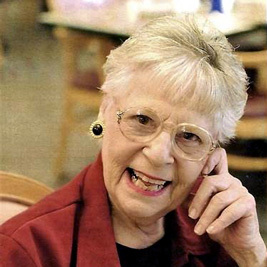
Decades-Long Resident and Volunteer Dorothy Scott: In Memoriam
There is something special about each and every resident of Los Angeles Jewish
Health, and Dorothy Scott was no exception. Her daughter, Mary Jane Dante, attributes
Dorothy's impact (at Los Angeles Jewish Health and in the wider world) to natural
charisma. "My mom was gifted," she says. "She could walk into a room,
learn people's names, and retain the information; by the time she would leave, she
would have developed a rapport with everybody there. She was truly the 'hostess
with the mostest'—congenial, funny and absolutely lovely in every way."
Dorothy, incredibly, lived at Los Angeles Jewish Health for nearly three decades
before her recent passing this March at 100 years old. She left an amazing impression
wherever she went. As a young woman, she parlayed her natural beauty into a modeling
career. She loved to sing, dance, and entertain and would perform for the United
Service Organizations (USO), often opening for Frank Sinatra. In Los Angeles, Ol'
Blue Eyes was a regular part of Dorothy's social circle: She and her beloved husband,
Mark—a sportscaster for the PCL Hollywood Stars baseball team and one of the
originators and host of TV's "Homerun Derby" – regularly spent time with
the Sinatras, Dean Martin, Peter Lawford, and other members of the Rat Pack. "My
parents made an incredibly dashing, handsome couple, and they fit right in with
Hollywood's in-crowd," Mary Jane says.
Mark died in 1960 at the age of 45, leaving Dorothy to raise their two young
children on her own. Hollywood glamour receded into the distance as she went back
to work full-time, earning a living with fashion-related jobs in retail. "Mom
never returned to acting or dancing after Dad was gone; she felt she had to be serious
and support us kids. She was so dedicated to us—she wanted us to be of good
character and to be happy and successful, and she did everything she could to make
that happen," Mary Jane says.
Dorothy never remarried, and following the Northridge earthquake in 1994—after
34 years of "flying solo"— she was tired of living on her own. "Mom
was only 72, and she was incredibly healthy, but she wanted to be part of a community,
and she chose Los Angeles Jewish Health," Mary Jane says. "My Aunt Estelle
was living there, and Mom went to visit all the time, so she already felt comfortable
and knew it was the right place for her."
Once she moved in, she never looked back. "Mom made a life at Los Angeles
Jewish Health—she didn't expect to be waited on," Mary Jane says. "She
immediately started volunteering in Arts & Crafts; she delivered the mail; she
would take prospective families on tours of Eisenberg Village, where she initially
lived." She also completed coursework to become a para-chaplain, helping to
meet the spiritual needs of her fellow residents and patients at Encino Hospital.
Working in the synagogue at Los Angeles Jewish Health was very important to her,
as well.
"Dorothy was integral to our religious life here," says Rabbi Ron Goldberg,
rabbi of Los Angeles Jewish Health's Eisenberg Village campus. "Her work was
valued and appreciated, and her fellow residents adored her. She was very much a
presence at Los Angeles Jewish Health."
In recognition of her many contributions to community, Dorothy was honored in
2006 by the Los Angeles City Attorney's Office with its LA Pearls Senior Citizens
of the Year Award. She also received many awards such as a certificate of appreciation
from UCLA School of Medicine for her participation in their Multicampus Program
for Geriatric Medicine and Gerontology, and recognition for completing the training
program for Los Angeles Jewish Health Hospice Services. At Los Angeles Jewish Health,
Dorothy was honored as "Resident of the Year," and she earned accolades
for her musical achievement. In addition, she received a special certificate thanking
her for "the time, effort, and love" she brought to every endeavor. "Mom
channeled her passion into service, and she gave of herself for 20 years, until
it was time to have some of that love returned," Mary Jane says.
During her mid 90s, Dorothy's mind remained sharp, but her body began to slow—and
as she accessed more of Los Angeles Jewish Health's services, the staff treated
her like royalty. "They took care of her like she was the queen of England,"
Mary Jane says. "She wouldn't have lived till 100 if she hadn't had the love
and support of the staff, the nurses, and all the other people at Los Angeles Jewish
Health. There simply is no better care."
After a century of living, Dorothy was ready to rest. "Her faculties were
still amazing for that age, and she didn't suffer, which makes me eternally grateful,"
Mary Jane says. "As hard as it is not to have her here anymore, she had a very
full life, and I'm thankful to Los Angeles Jewish Health for enabling her to make
the most of every day."
Mar
31
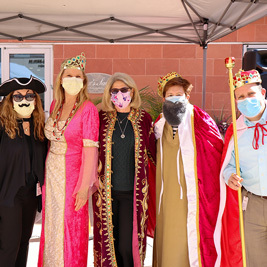
Purim Brings Joy to Los Angeles Jewish Health
Around the world, Purim is a joyous holiday that marks the survival of
ancient Persia's Jewish community against long odds. At Los Angeles Jewish
Health, the celebration is especially festive—with staff and volunteers
working hard to make it special for all residents.
On Purim, Jews read
from the megillah to retell the story of Esther, the biblical heroine who risks
her life to save the Jewish people from annihilation. Her husband, King
Ahasuerus, is served by a scheming vizier named Haman who, fueled by a personal
vendetta, hatches a plot to kill all of the kingdom's Jews. When Esther reveals
herself as a Jew to the king, he upends Haman's plan and instead has Haman
hanged on the very gallows the evil advisor had built for the Jews.
Across Los Angeles Jewish Health campuses, residents and staff came together for
a glorious day of exuberant celebration. At Grancell Village, an Orthodox rabbi
dressed as a cowboy read the megillah while residents used graggers
(noisemakers) and booed every time Haman's name appeared in the narrative. As
part of the celebration, Los Angeles Jewish Health staff dressed in costume and
performed a Purim spiel, or skit, as residents watched on with delight.
"What's so wonderful about Purim at Los Angeles Jewish Health is that all of our
staff, across diverse departments, participate to bring joy to our residents,"
says Chief Mission Officer Rabbi Karen Bender, who dressed as Haman for the
spiel. "Our tradition says that, when we enter the month of Adar on the Jewish
calendar [the month during which Purim falls every year], we need to spread as
much joy as possible for the entire month. So, leading up to the holiday, I came
to campus dressed as a penguin, a banana, and a hamantaschen [a triangular
holiday cookie in the shape of Haman's hat]. One day, I wore a blue top hat and
bow tie to bring levity so residents would feel the joy of this time of year."
Corey Slavin, senior vice president of the Los Angeles Jewish Health
Foundation, dressed up as Mordechai (Esther's uncle) in the spiel. For her,
participating in the Purim festivities is particularly meaningful. "To play a
role in celebrating a Jewish holiday that is focused on bringing fun and
merriment to residents is amazing because I get to be part of the very community
I'm raising money to help,"she says. "Our seniors, with their wisdom and
insight, give us so much; I'm thrilled to give back to them. It's exactly why I
come to work every day."
In the afternoon, a nursery school class came
to campus; dressed in costume, the children put on a dance and then handed
residents masks they could wear themselves. "The kids brought a whole other kind
of incredible energy,"Rabbi Bender says. "After they gave out the masks, I
distributed mustaches to any residents who wanted to stick them on!"
Staff in costume also paraded across Grancell Village to make sure they brought
the celebration to every corner of campus. "It was terrific because, if you
couldn't come to Purim—if you were in rehab, for example, or just got out of a
procedure—we brought Purim to you. And the staff had a blast,"Rabbi Bender
says.
At Eisenberg Village, Rabbi Ron Goldberg recruited residents to
read the Purim tale to the larger community. "We read it mostly in English on
our campus, which gave our residents a chance to understand the story. In
addition, we had popular musician Cindy Paley lead us in song, which added a lot
to the joyful experience,"Rabbi Ron says. "After so many years of COVID, people
were really excited to be part of it all."
Amidst the festivities, Rabbi
Ron also led residents in an eternal Purim debate. "We had heated discussions
about the best flavor of hamantaschen,"he laughs. "My two favorites are cherry
and poppyseed, but I think the best flavor is whichever one you happen to have
in your hand."
Mar
1
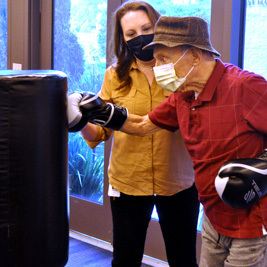
At Los Angeles Jewish Health, Short-Term Rehab Delivers Long-Term Results
In the world of short-term rehabilitation for seniors, not all programs or
facilities are created equal. Given its breadth of services, depth of
experience, and track record of results, Los Angeles Jewish Health's high-impact
short-term rehab is in a class by itself.
Under the supervision of
Director of Rehabilitation Services Daniel Persichetti, the offerings are
robust. "We have seven distinct short-term rehab operations at Los Angeles
Jewish Health, each one geared to meet diverse seniors' needs," he says. "It's
terrific because it means we're able to help with a wide range of challenges,
getting people back on their feet and ready to reclaim mobility and function
that may have been compromised due to a recent hospital stay or illness."
The programs include short-term, skilled nursing facility-based rehab at Los
Angeles Jewish Health's Grancell Village campus; a PACE (Program of
All-inclusive Care for the Elderly) clinic at the Brandman Centers for Senior
Care, also located in Grancell Village; and outpatient services on the Eisenberg
Village campus and at Fountainview at Gonda Westside, in Playa Vista.
"When older adults are released from the hospital, they may not be quite ready
to return home, so they come stay with us for a bit, instead," Daniel says.
"Maybe they can't walk very far or have difficulty climbing out of bed. Perhaps
they've just had a hip or knee replacement, or they've suffered a stroke. We
equip them with the right tools to build up their strength and recover their
independence."
The outpatient clinic at Eisenberg Village is also open
to members of the general public, who can come to campus to leverage Los Angeles
Jewish Health's renowned expertise in senior care. "Our speech therapists and
physical therapists are available for things like memory and cognition training,
improving balance and gait, and refining overall strength and function," Daniel
says. "As those in need of these services discover just how good our care is,
more and more people from the greater community are relying on us every day."
In addition to having access to an outpatient clinic, seniors participating
in PACE at the Brandman Centers may benefit from home visits, as well.
"Sometimes, our therapy staff will go to a participant's home to make sure they
have the tools they need to help in their recovery. For instance, they may
evaluate if a grab bar is in the right spot for the shower, or ensure the person
has the appropriate ramp to make their house accessible—essentially,
making equipment recommendations to help seniors live in their homes for a
longer period of time," Daniel says.
He and his team of about 30 full-time therapists (plus 20 or so per diem staff) also treat longer-term Los
Angeles Jewish Health residents. "Sometimes, folks in assisted living may
experience a decline—say after a fall. Our caring team provides them
with therapy two or three days a week to help them improve," he says. "One of
the things that makes our therapy so successful is that, because it's in-house,
we develop good collaborative relationships with nurses and other Los Angeles
Jewish Health staff, so we can work together as a team to get residents better
in a timely manner."
As Daniel sees it, these partnerships are a key
distinguishing feature of rehab services at Los Angeles Jewish Health. "I've
worked for many companies over the past 17 years, starting out in acute care and
then moving on to aquatic therapy, outpatient care, and acute rehab. But working
for Los Angeles Jewish Health is like night and day. Not only is there a real
family atmosphere here, but also, the primary focus is different: It is about
serving people and the community, rather than solely on generating financial
gain."
For Daniel, one of the most gratifying parts of the job is
watching people start to feel empowered when they realize they can do things on
their own. "We see so many success stories," he says, "and I'm proud of the
gains our seniors make with our support."
Among Los Angeles Jewish
Health's satisfied short-term rehab customers is David Goldstein, who sought
intensive physical therapy after fracturing his humerus (upper arm bone). "Los
Angeles Jewish Health staff are responsive, they know what they're doing, and
they make you feel like you're in your own home," he says. "Although being here
is only temporary, they've done everything possible to make me comfortable and
happy. I chose the right place, and I would highly recommend it."
Mar
1
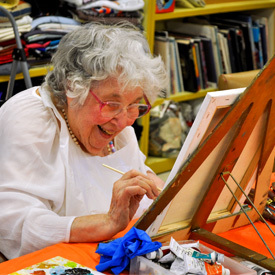
The Art of Making Crafts at Los Angeles Jewish Health
Arlene Bercu
Los Angeles Jewish Health is renowned for advancing the health of older adults across our
community. Its commitment to raising the bar on compassionate, high-quality care
includes a dedicated focus on emotional wellness—engaging seniors in creative,
stimulating activities that help them find enjoyment in every day. Los Angeles
Jewish Health's Arts and Crafts Program is a prime example, bringing people
together to give life to new ideas and make memories along the way.
The
Arts and Crafts Room is a bustling hub of energy at Los Angeles Jewish Health,
offering residents resources, guidance, and camaraderie as they develop their
creative talents and produce a wide range of beautiful handcrafts. "It's where
we host instructors for oil-based painting classes, and where we teach knitting,
quilting, crocheting, and all the various needlecrafts," says Annette Weinberg,
Los Angeles Jewish Health's campus lifestyle and enrichment director for
Eisenberg Village. "The studio is packed full of every possible supply material
for any project a resident would like to do."
Staffed by Arts and Crafts
Director Radka Falk, the Arts and Crafts Room enables residents to express
themselves while achieving a state of emotional Zen. "Creativity is soothing for
the soul, and this is such an uplifting environment," Annette says. "People
often spend hours here, and their tasks take them away to a whole other place."
Norma Garber
Norma Garber, 89, is one of those people, a lifelong seamstress who trained
as a young girl in England to be a high-end dressmaker. She volunteered at Los
Angeles Jewish Health before becoming a resident about four and a half years ago
and notes that, even then, she knew the Arts and Crafts Room would be where she
would spend much of her time once she moved in.
"I like quilting and
making pillows, challah covers, and table runners. I love everything I do here;
I call it my ‘happy room,'" Norma laughs. "Radka is amazing—there isn't
anything she doesn't know how to do. And I get to spend time with my friends,
like Casey Joseph, another quilter."
Toby and Clara Silnik
Casey, 89, enjoys the shared sense
of purpose the Arts and Crafts Room inspires. "Spending time with Norma is
great: It's nice to have someone to talk to who understands what you're trying
to do and can help you map it out," she says. "I love the creativity and beauty
of using my hands to make something. The idea that one of my quilts is keeping a
baby, a child, or an adult cozy, just warms my heart."
In addition to
nurturing residents' creative impulse, the Arts and Crafts Room also welcomes
visitors interested in viewing—and even purchasing—some of the goods made on
the premises. A gallery of canvases painted by residents is on permanent
display, and a small, on-site store offers a number of resident-made items for
sale.
Director Radka Falk
"The money we make from the shop gets reinvested into the gift
shop so we can continue buying supplies for residents to craft with!" Annette
says.
Frequenters of the Arts and Crafts Room are often joined by Los
Angeles Jewish Health volunteers, who bring a variety of craft projects with
them for residents to complete.
"The items you can find in the shop are
just gorgeous. But, even more importantly, making those items does absolute
wonders for our residents' well-being," Annette says. "When they're here, their
spirits soar."